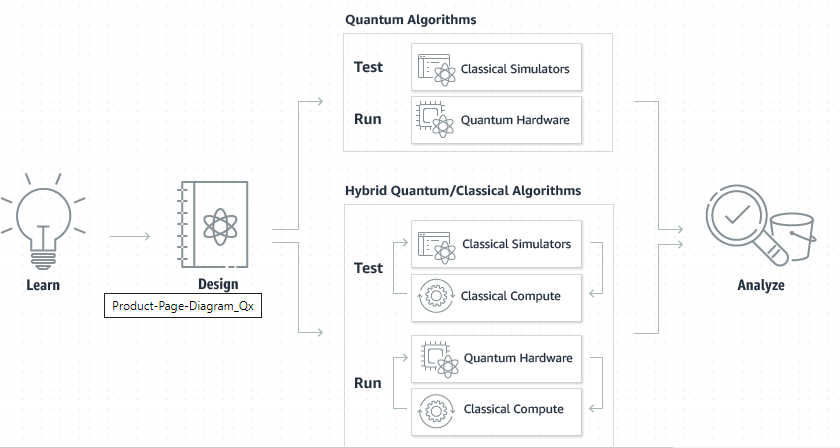| Amazon Braket On The Quantum Bandwagon |
| Written by Mike James |
| Tuesday, 03 December 2019 |
|
Amazon has just announced an extension to the range of instances offered by the AWS cloud services - quantum! Why? First I have to say that I like the name. I was more impressed by Dirac's invention of the <bra| and |ket> notation for co-vectors and vectors that so cleverly yields <bra|ket> when you form the inner product, but yes, calling it Braket is appropriate. What Amazon has done is basically invented a clever name and jumped on the quantum computer bandwagon without having to invest in building a device. Braket is nothing really new - IBM, Microsoft and others offer similar facilities. What we have is a standard way of specifying an arrangement of quantum gates that can be then run on a simulator. We refer to this as some sort of programming, but to be honest it is nothing like what we know as programming. It is essentially finding transformations of quantum states that give you a new state that yields the answer. This is a tough technique to crack and you cannot suppose that being able to program puts you in a good position to tackle programming a quantum machine, which is more like arranging a simulation that gives you the result you need. Finding the simulation that gets the result is difficult and so far there is no simple or automatic way to find said configurations. Apart from Shore's and Grover's, most algorithms aren't applicable to the sort of problems that classical computers are used for. This drove Hewlett Packard to give up on quantum computers some time ago with the promise that, if quantum computers ever seem to offer something to the sort of customers that it handles, it would reconsider the idea. HP clearly had a much better idea of the way of the world than Amazon and jumped off the bandwagon not onto it.
As in competing systems, Amazon allows you to run your program on a real quantum computer provided by third parties. Of course, you can't expect many qubits as so far we haven't managed to build a quantum computer with more than a few of them. The exception is the D-Wave system, which is a quite different type of quantum computer and really is a simulation machine capable of finding solutions to optimization problems using quantum annealing. Basically you set up the initial state and then let it relax into what you hope is the lowest energy state, which, if you have set things up correctly, corresponds to the optimum solution you are looking for. Of course, D-Wave has never proved that is can solve problems faster than classical machines. In fact, D-Wave's machine is so different I'm surprised to find that Braket supports it. So why am I so skeptical of Amazon's move? Is it that I'm a quantum computer denier? No, I think we will build a quantum computer some day, it's more that I'm not convinced that' apart from breaking a few codes, which we will promptly give up using, a quantum computer will be generally useful. Of course, it does depend on what you mean by "generally useful" but I doubt that anything like the average AWS user will get anything from exposure to quantum computing.
More InformationRelated ArticlesGoogle Takes On Quantum Computing Google Announces 72-Qubit Machine Nobel Prize For Computer Chemists Solve The Riemann Hypothesis With A Quantum Computer Boson Sampling Tests Quantum Computing A Quantum Computer Finds Factors The Revolution In Evolutionary Game Theory - Prisoners Dilemma Solved? $100,000 Prize For Proving Quantum Computers Are Impossible {loadposition signup} {loadposition moreNEWS} {loadposition moreNEWSlist} {loadposition comment} |
| Last Updated ( Tuesday, 03 December 2019 ) |


